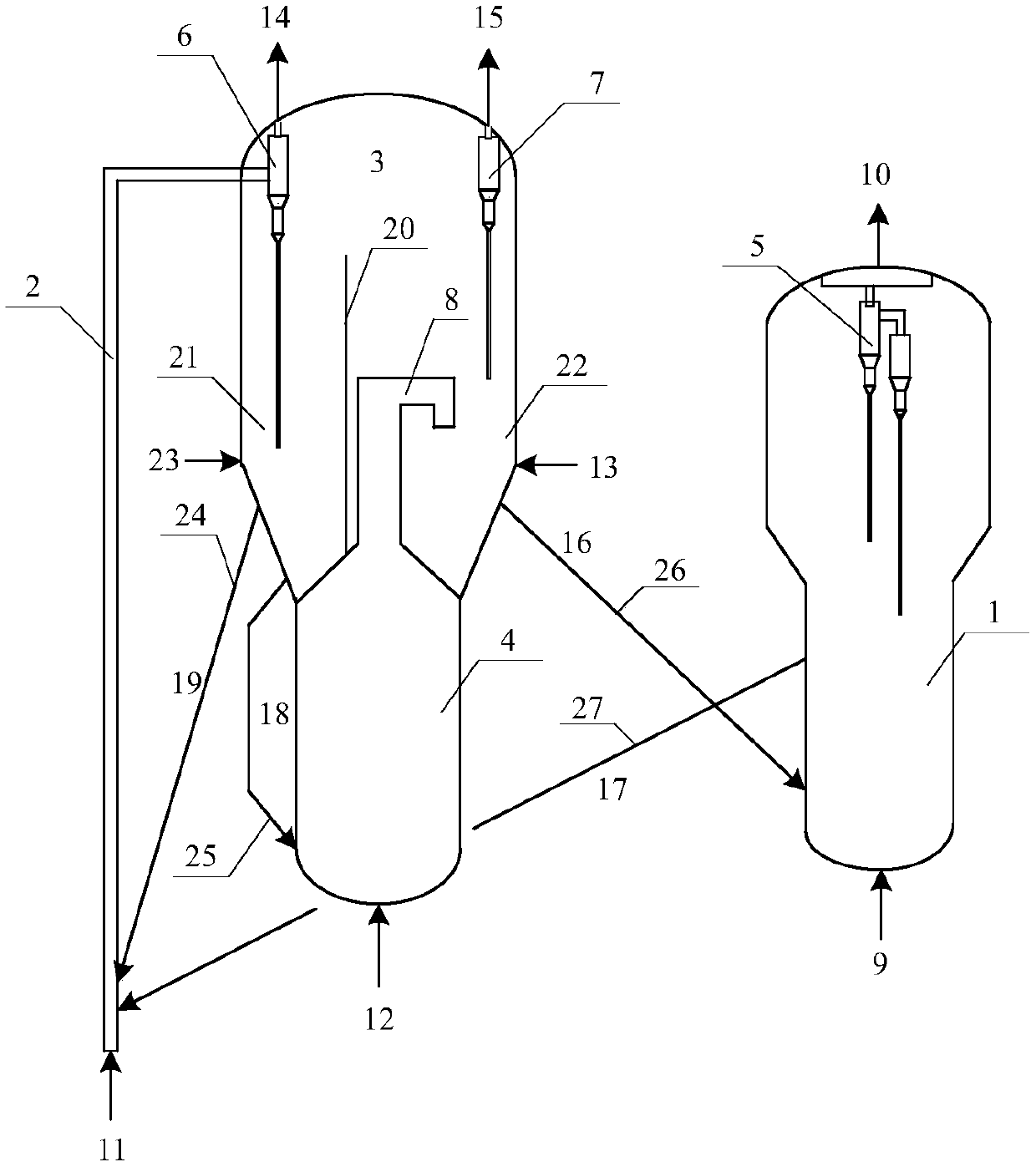Method for preparing aromatic hydrocarbons through efficient conversion of methanol
A technology for methanol and aromatics, applied in the field of high-efficiency conversion of methanol to aromatics, which can solve the problems of hydrothermal deactivation of catalysts and low yield of aromatics, and achieve good technical effects
- Summary
- Abstract
- Description
- Claims
- Application Information
AI Technical Summary
Problems solved by technology
Method used
Image
Examples
Embodiment 1
[0027] The methanol raw material with a methanol mass percentage of 100% enters the fluidized bed reactor and the modified ZSM-5 catalyst at 440°C, the reaction gauge pressure is 0 MPa, and the methanol weight space velocity is 0.2 hours -1 The reaction product containing aromatic hydrocarbons and the catalyst to be generated are separated by the cyclone separator of the reactor, and the reaction product enters the subsequent separation system; the catalyst to be generated enters the riser regenerator and is contacted and regenerated with the regeneration medium I, and the obtained semi-regenerated The catalyst and flue gas I enter the riser regeneration cyclone which is connected to the riser regenerator, the separated semi-regenerated catalyst enters the second dense bed zone A to contact with the degassing medium I, and the separated flue gas I enters the subsequent flue gas system ; 20% of the semi-regenerated catalyst after degassing is returned to the riser regenerator, a...
Embodiment 2
[0037] According to the conditions and steps described in Example 1, the methanol raw material with a methanol mass percentage content of 10% entered the fluidized bed reactor and the catalyst at 550°C, the reaction gauge pressure was 1 MPa, and the methanol weight space velocity was 15 hours. -1 50% of the semi-regenerated catalyst after degassing returns to the riser regenerator, and 50% of the semi-regenerated catalyst after degassing enters the fast bed regenerator and is contacted and regenerated by regeneration medium II.
[0038] The height of the partition is 90% of the total height of the second-dense bed; the volume ratio of the second-dense bed A area and the second-dense bed B area is 1:1.
[0039] The temperature of the catalyst in the fast-bed regenerator was 700° C., the density of the catalyst bed was 110 kg / m3, and the catalyst residence time was 5 minutes.
[0040] The catalyst temperature in the riser regenerator was 600°C, the catalyst density was 50 kg / m3,...
Embodiment 3
[0046] According to the conditions and steps described in Example 1, the methanol raw material with a methanol mass percentage content of 98% entered the fluidized bed reactor and the catalyst at 490 ° C, the reaction gauge pressure was 0.3 MPa, and the methanol weight space velocity was 4 hours. -1 30% of the semi-regenerated catalyst after degassing returns to the riser regenerator, and 70% of the semi-regenerated catalyst after degassing enters the fast bed regenerator and is contacted and regenerated by regeneration medium II.
[0047] The height of the partition is 70% of the total height of the second-dense bed; the volume ratio of the second-dense bed area A and the second-dense bed area B is 0.8:1.
[0048] The temperature of the catalyst in the fast-bed regenerator was 650° C., the density of the catalyst bed was 180 kg / m3, and the catalyst residence time was 25 minutes.
[0049] The catalyst temperature in the riser regenerator was 570°C, the catalyst density was 82 ...
PUM
 Login to View More
Login to View More Abstract
Description
Claims
Application Information
 Login to View More
Login to View More - R&D
- Intellectual Property
- Life Sciences
- Materials
- Tech Scout
- Unparalleled Data Quality
- Higher Quality Content
- 60% Fewer Hallucinations
Browse by: Latest US Patents, China's latest patents, Technical Efficacy Thesaurus, Application Domain, Technology Topic, Popular Technical Reports.
© 2025 PatSnap. All rights reserved.Legal|Privacy policy|Modern Slavery Act Transparency Statement|Sitemap|About US| Contact US: help@patsnap.com

